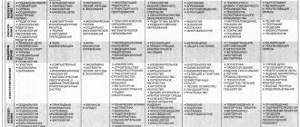Parent meeting with future first-graders
slide number 21
Love your child!
Love anyone: untalented, unsuccessful.
When communicating with him, rejoice, because a child is a holiday,
who is still with you!
slide number 22
Remember!
A child is the greatest value in your life. Strive to understand and get to know him, treat him with respect, adhere to the most progressive methods of education and a constant line of behavior.
Parents are given reminders from their child:
Don't nag me or nag me. If you do this, then I will be forced to defend myself, to pretend to be deaf.
Never even hint that you are perfect and infallible. It gives me a sense of the futility of trying to compare with you.
Don't be afraid to be firm with me. I prefer this approach. This allows me to determine my place.
Don't do for me and for me what I can do for myself.
Don't make me feel younger than I really am. I will take it out on you by becoming a “crybaby” and a “whiner.”
Don't put my honor to the test too much. When intimidated, I easily turn into a liar.
Don't make promises you can't keep - it will shake my faith in you.
Don't let my fears and worries worry you. Otherwise I will be even more afraid. Show me what courage is.
slide number 23
Dear parents! On September 1, 2014, your child will begin studying in first grade according to the new federal state educational standards.
slide number 24
According to the requirement of the new standards, the acquired knowledge should not be dead weight: you have memorized the rule, but did not understand anything. A child should be able to freely use this knowledge, independently find and expand it, and apply it in life. In the lessons now, the main attention will be paid to the development of the child’s activities, the implementation of various design and research work. It is important not just to transfer knowledge to the student, but to teach him to master new knowledge and new types of activities.
slide number 25
Another feature of the new standard is that it is being introduced as a social contract. If previously the main responsibility for educational outcomes was the child, now their number has been expanded. From the moment the child enters school, a tripartite agreement must be concluded between the parents, the director of the institution and the head of the municipal level, which spells out the rights and responsibilities of each party.
Parents
are obliged to ensure that the child attends lessons, completes homework, reports the reasons for the child’s absence from classes, and attends parent-teacher meetings.
The school has
more responsibilities, and the main one is to provide free quality education to students.
The municipality
undertakes the maintenance of the school and also assists parents and students in obtaining education in the required form.
Speech by a teacher-psychologist at a general meeting of parents of future first-graders.
A child’s admission to school is always an exciting moment, both for children and parents. When to start preparing for school? Who should do this? What to teach a child before school? Some believe that you should start preparing your child at the age of three, others - a year before entering school. But in general, the entire preschool life of a child is preparation for school. The most important thing is not to go to extremes. Do not overdo it with your studies, instilling in advance an aversion to learning. But don’t let everything take its course, relying, for example, on a kindergarten teacher. Formally speaking, child psychologists identify several criteria for children’s readiness for school.
1. Intellectual readiness (ability to concentrate, ability to build logical connections, memory development, fine motor skills); 2. Emotional readiness (motivation to learn, ability to concentrate, managing emotions); 3. Social readiness (need for communication, correction of behavior in a team, ability to learn).
Many people believe that if a child attends a kindergarten, it means that preparation for school is entirely provided by its staff. Indeed, specially organized classes help children prepare for school. But without the help of parents, such preparation will be incomplete and of poor quality. The child needs constant consolidation of knowledge: he must check and consolidate what he has done at home in kindergarten and, conversely, he needs to share the knowledge acquired in kindergarten with his parents.
Usually, when they talk about a child’s “school” readiness, they mainly mean his intellectual development. But there is another, no less important side. And it is connected with the psychological preparation of the child. Here are some points worth paying attention to.
— As soon as your child becomes a schoolchild, he will be left to himself much more time. Therefore, in order for you to be calm for him, you should, first of all, develop independence in the child. The child must be able to stay home alone if necessary. Teach him to follow basic safety principles.
— Possession of self-care skills is also necessary for a child at school: he must be able to independently change into a sports uniform, pack his briefcase, etc.
-The child must have developed the ability to organize a workplace, start work on time, and be able to maintain order in the workplace during school work.
— It is important that before school the child has a fairly diverse experience of communicating with strangers - both adults and children. Give your child the opportunity to practice making new connections. This can happen in a clinic, on a playground, in a store. — Some children get lost without the skill of “surviving in a crowd.” As a form of exercise, from time to time you can take your son or daughter to a big entertainment event.
— It’s no secret that people around you are not always friendly and full of understanding. Teach your child not to get confused when you are criticized or - the child's version - teased. Prepare him for the fact that at school he may encounter negative evaluations of his work. That is, at home it is important to have experience of both praise and blame. The main thing is that the child understands: when criticizing him, you are assessing not his personality as a whole, but a specific action. It’s great if you have developed a fairly stable positive self-esteem. Then the child will not be offended by the teacher’s remark or not too high assessment, but will try to change something.
— It is important for a child to be able to express his needs in words. At home, those around him understand him instantly or by his facial expression. Don't expect the same from your teacher or classmates. Ask your child to communicate his desires in words; if possible, organize situations where he needs to ask an unfamiliar adult or child for help.
— At school, the child will often find himself in situations of comparison with peers. This means that even before school it is worth watching him in games that include a competitive moment, competition between children. How does he react to the success of others, to his own failures?
— Try to get the child used to working independently and not requiring constant attention and encouragement from an adult. After all, in a lesson the teacher is unlikely to be able to give everyone equal attention. Gradually stop praising your child for every step of the work - praise him for the finished result.
- When performing any task, do not allow it to stop in the middle. It is necessary to immediately orient the child to complete any task from beginning to end - when cleaning the room, helping parents, completing a task, etc.
— Teach your baby to sit quietly and work for a certain time. Include a wide variety of activities in your daily routine, alternating quiet work at the table with active games. This is especially important for an excitable, active child. Gradually he will get used to the fact that it is possible to scream and run at a certain, “noisy” time. Then he will be able to wait for the break at school. — From the first days, your first-grader will feel confident if you instill in him basic skills for working in the classroom in advance. For example, teach how to hold a pencil correctly, navigate the page of a notebook or book, listen carefully to instructions and follow them, count the required number of cells, etc.
Often, parents of preschoolers, when telling their children about school, try to create an emotionally unambiguous image. That is, they talk about school only in a positive or only negative way. Enthusiastic parental responses usually sound like this: “It’s so interesting at school,” “You’ll be an excellent student here.” Parents believe that by doing so they are instilling in their child an interested attitude towards learning activities, which will contribute to school success. In reality, a student who is committed to joyful, exciting activities, having experienced even minor negative emotions (resentment, jealousy, envy, annoyance), may lose interest in learning for a long time. The school provides enough reasons for such emotions: a situation of failure against the backdrop of seeming general success, insufficient attention from the teacher, a discrepancy between the teacher’s assessment and the usual parental assessment, as well as many similar situations.
Other parents, realizing that the child will not succeed in everything at school the first time, prepare him for failure in advance: “Let’s try, it will be even more difficult at school,” “This is still a small task, they will ask more at school.” Sometimes the image of the school is used as intimidation: “The teacher will give you bad marks,” “For such behavior at school they will immediately write you down as a hooligan.” Such parental advice is unlikely to teach children perseverance in overcoming difficulties. Rather, they will prepare the ground for real failures and faulty behavior. Thus, neither an unambiguously positive nor an unambiguously negative image of the school brings benefit to the future student. It is better to focus your efforts on familiarizing your child with school requirements in more detail, and most importantly, with himself, his strengths and weaknesses.
Tell your child about how you went to first grade, about your studies at school, about your teachers, look at your school photos with your child, play school, talk about school rules.
It is necessary to dwell on one more important point. A developed child and a school-ready child are not the same thing. Education is those skills that a child has been taught: the ability to write, read, count. Intellectual development is the child’s mental potential, the ability of a child to move independently, to learn independently, and to solve problem problems. That is, training and mental development are by no means synonymous! Learning can make life easier for a child in the first months of school and even create temporary success for him. But there is also a danger that the child will be bored with studying. In addition, at a certain point, the reserve of training will be depleted - you won’t last long on old reserves. Therefore, it is better to focus your attention not on speeding up the educational skills that a child should, in theory, master at school, but on the development of mental functions that ensure learning ability - attention, memory, thinking, imagination, hand motor skills, development of social skills. What to do with your child so that he is ready for school? First of all, we need to take care of his health. Swimming, walking, cycling - these are activities that contribute to the future successful entry into school life. The most important way of development (relating to speech, attention, communication, memory, imagination, and much more) is to read books to a child. You need to read (or tell) fairy tales to children for at least half an hour a day. Activities that make fantasy, imagination, and independent ingenuity work are useful: drawing, modeling, designing. We must use this period to develop diverse knowledge, to accumulate different information about the world of things and people. During this period, the child acquires the primary experience of experiencing positive and negative emotions, learns to rejoice, suffer, sympathize, and the foundation of his personality is laid.




